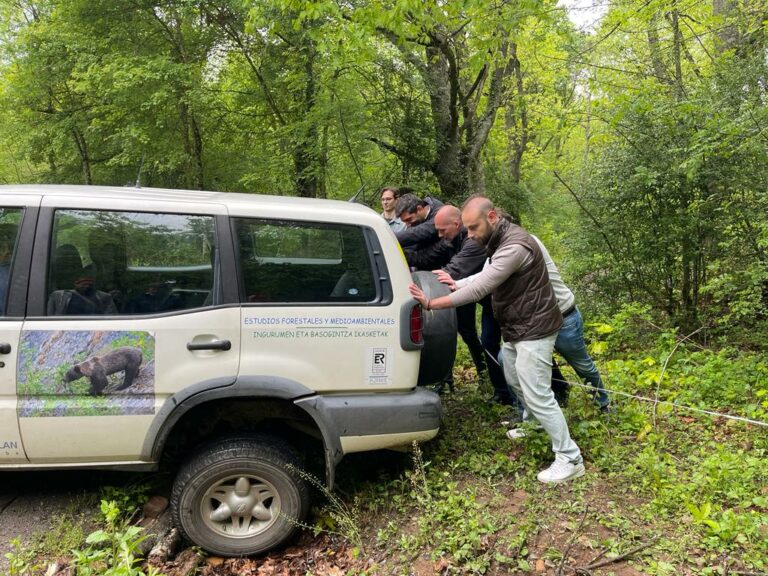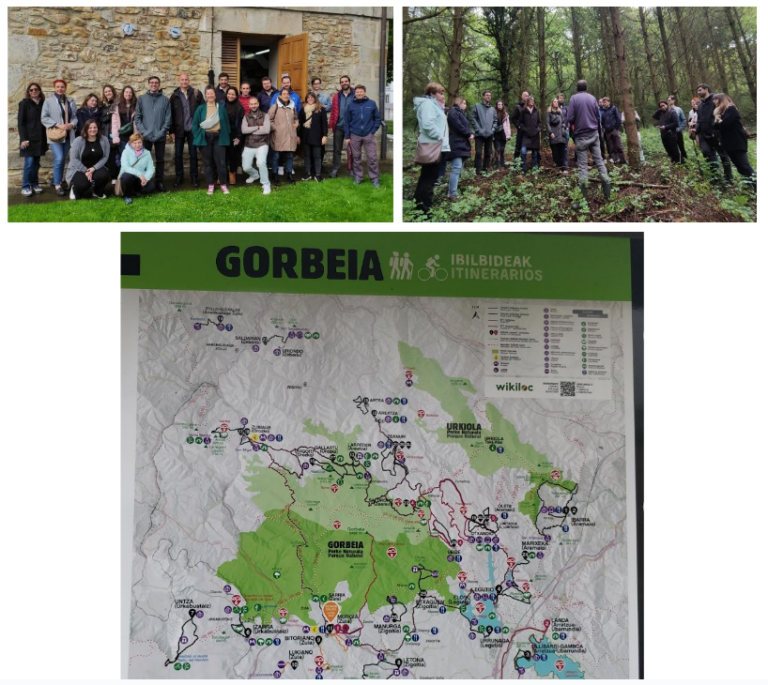
The BECoop team met in May in Bilbao and places nearby to discover together the Spanish pilot case, visits organised by the GOIENER team. We visited various places guided by experts in biomass, forest management, and energy communities.
Town Hall of Zuia
We started with the Town Hall of Zuia, where a local forest management school and GOIENER tested using local wood chips in the biomass boilers from surrounding forests).
There are expectations that a local provider could launch this activity, with nearby buildings which could use bioenergy (swimming pool / sport centre). Public buildings must soon, by law, change from fossil fuel boilers to Renewable Energy Sources – RES, representing an opportunity. Buying the chips from suppliers located further away has recently increased a lot in price.
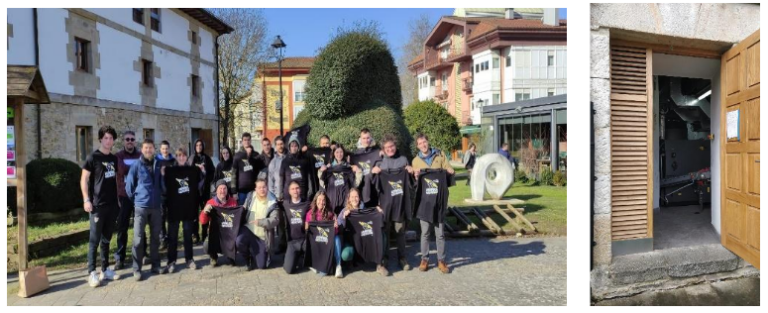
Forest management school, Murgia
Where did these local chips come from?
20 students, guided by Juan Carlos, went to pick up trees in publicly-owned parcels, then made the wood chips. They first dry the wood, from Douglas fir, then chip, then burnt in the town hall. For 3 years, they optimised the process parameters for a wood-chipping machine, made tests to find the perfect size and perform analysis when burning (particles and ashes).
All hope that a student could launch the activity of producing and selling biomass.
We were then brought to the woods where the trees come from, divided between public and private estate. He explains that the spruce that have grown are too close and small, they need to be cleared and cannot be used for furniture: biomass is then the most sustainable option. Cleaning the forest here helps protect it from fires. The work is hard, and more expensive, as the trees can only be manually picked / cut, and then cable-pulled until the road.
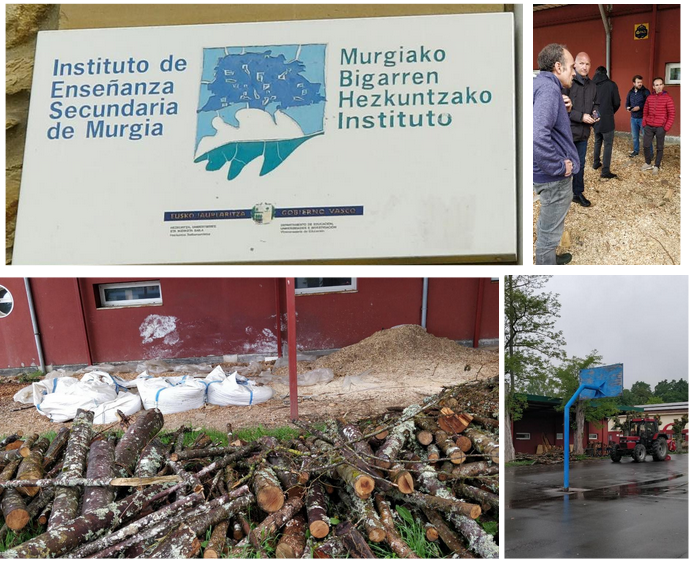
Vitoria-Gasteiz city council
A city of 250 000 inhabitants, with 63 rural hamlets surrounding the city and summing together 5000 inhabitants.
David Fermoselle and Andres Alonso from the Sustainability, climate action and energy area of the city, welcome us in the “Centro Cívico Salburua”, a multi-purpose centre in the city, with sport facilities, a library and the option to participate in many various activities.
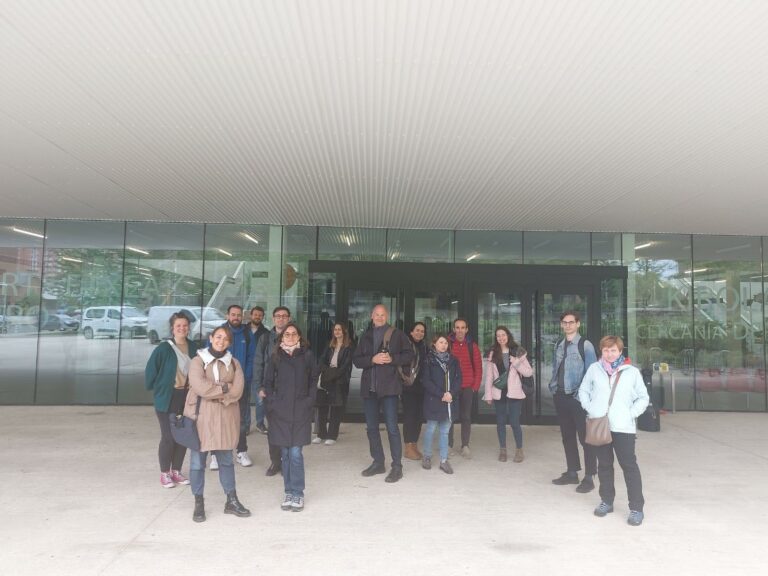
They show us a presentation about the city, where we discover its engagements and the numerous programs it follows / belongs to / won: Agenda21, Covenant of Mayors, EU Green Capital, Global Green City Award, and many more!
In 2021, there was no energy community in the city, and the related EU Directive is pending transposition in Spain. Yet, the city decides to act and launches a 3-step process to empower people against energy poverty:
- KNOW – 2022, initial support process to citizens (over a 1000 people attended the launch event!)
- DECIDE – 2023, temporary consultancy services. A phase split in two, one for the city with 18 workshops, one for the villages with 2, from March to June 2022. They allowed citizens to meet, provided information on how to start a project, the obstacles and solutions, etc. Then, 2 sessions at the end of 2022, to go deeper in the technical and legal aspects, sharing useful tools – they were recorded and uploaded to the City council website.
- ACT – 2024, community transformation office implementation, for dissemination, support, advisory services, in an office shared with the Municipal society Ensanche21 in charge of housing retrofit, regeneration and urban revitalization.
GOIENER, BECoop partners, joined the effort in 2023 to provide support.
The city generally utilised various communication channels, such as their website, bus stops, newspapers, and dissemination campaigns. The aim was to establish a connection and inform people about the upcoming developments.
The citizen energy empowerment programme in place allows citizens to get rooms where to meet, training and support, such as consultations on administrative, legal issues, governance, promotion and development of the community, financing and technical aspects.
Spotlight on 2 projects
- The Zaramaga regeneration project involves 525 houses to be retrofitted, including eco-mobility (EVs) and digitalisation. The aim is to install solar on roofs, with one fifth of them under the energy community principle. Additional ones will be installed on municipal buildings. One of the key goals is to alleviate energy poverty. (
For more on how energy communities play a role in alleviating energy poverty, see the briefing developed by 10 EU-funded projects: https://www.becoop-project.eu/project-news/the-missing-tool-in-tackling-energy-poverty-empowering-renewable-energy-communities-in-the-energy-crisis-mitigation/)
- Municipal solar facilities for energy sharing. The Spanish legislation has evolved recently, allowing now the distance from the generation to the consumer to go up to 2 kms (500m before for roof mount PV). Energy generated by municipal buildings, including schools, can then cover a distribution area much larger.
30 energy community projects in creation, not driven by the municipality but by citizens themselves!
Focus on the participants – 1/3 of women, mostly wealthier people. However, lower-income groups have not formed driving groups. The municipality is trying to engage more people affected by energy poverty and are willing to assist them with knowledge transfer.
Aberasturi
The next stop in our visit shows us how forests are when not managed. Forests in the area most of the time are neglected and underutilised – Forests of Aberasturi are hard to be industrialised due to the difficulty of accessibility, making the biomass obtained more expensive. It seems that the rate of wood production exceeds the demand. There are allotments for use by the local people. However, only a few households rely on wood for domestic purposes. Even though biomass represents the main source for energy production in the Basque Country, it is primarily utilised within the local community. The idea now is to obtain wood for energy use and to install here in this small town of 60 houses, and if a grant is received which would cover 80-90% of the costs, biomass boilers by the end of 2023. The boilers will be (using chips + straw, separately) in a public urban area / land next to a football area. The cost is quite high for this installation as the houses are relatively far from each other.
The undamaged forest in Aberasturi and the allotments the local people are allowed to bring home
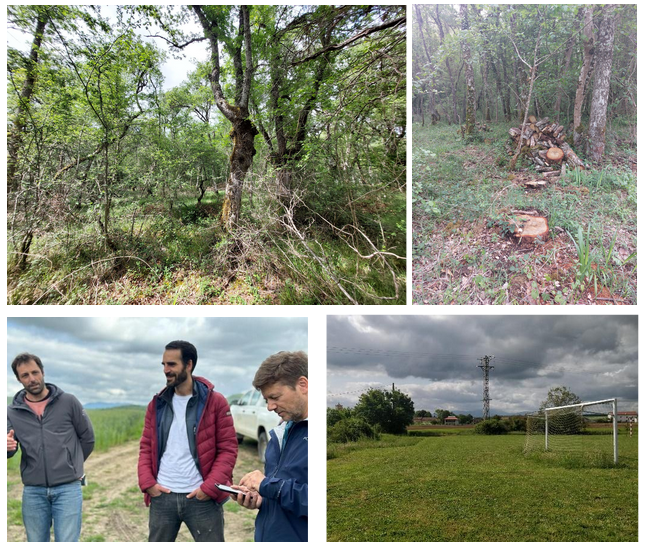
… and an adventure for the team
